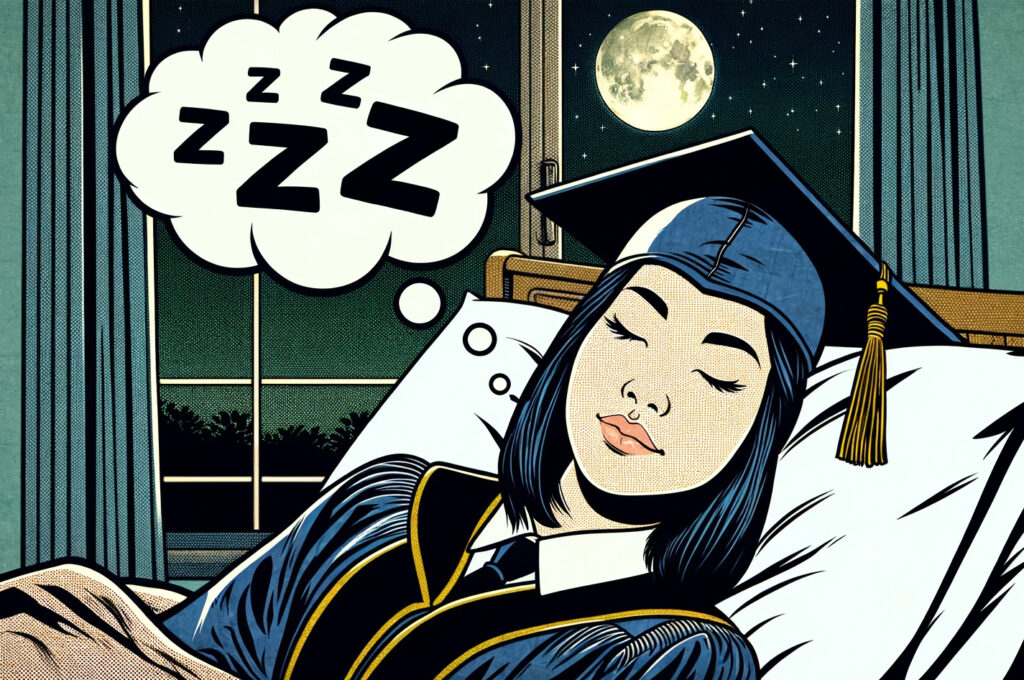As clocks spring forward to mark the beginning of Daylight Saving Time (DST), we’re all reminded of the annual ritual of losing an hour of sleep for the promise of longer, sunlit evenings. This transition, while seemingly minor, holds profound implications for recent graduates stepping into the workforce. The shift is not just about adjusting clocks; it’s a metaphor for the adaptability and resilience required in personal and professional life. Here, we explore best practices for managing sleep during this transition and how these strategies can set a foundation for success in life.
#1: Understand the Impact of Sleep on Performance
Research (and Jeff Bezos) consistently shows that quality sleep is crucial for cognitive function, emotional regulation, and overall health. As graduates transition into the workforce, the demands of new roles and responsibilities can tempt one to cut back on sleep. However, prioritizing sleep is akin to investing in your productivity and well-being. Recognize that adjusting to DST is an opportunity to reassess and prioritize your sleep habits.
#2: Embrace the Light
The extra hour of daylight in the evening is DST’s gift. Use this to your advantage by exposing yourself to natural light during the day, especially in the morning. Light is a powerful cue for your circadian rhythms, helping to regulate sleep patterns. Neuroscientist Andrew Huberman highlights how natural daylight can significantly enhance mental and physical health by synchronizing our internal clocks with the day, advocating for the importance of morning light exposure and mindful use of artificial light at night to maintain our well-being. For graduates, this is a lesson in harnessing resources—be it daylight or professional opportunities—to fuel growth and adaptability.
#3: Establish a Sleep-Conducive Environment
Just as you curate your workspace for productivity, your sleep environment requires attention. Ensure your bedroom is cool, dark, and quiet. Consider using blackout shades, and be weary of white noise machines. This practice of creating an optimal environment extends beyond sleep to every aspect of your life, teaching the importance of preparation and environment in achieving success.
#4: Limit Evening Stimulation
In the era of smartphones and constant connectivity, it’s easy to fall into the trap of late-night screen time. However, the blue light emitted by screens can interfere with your ability to fall asleep. Set a digital curfew an hour before bed to wind down. Nightlight features on many devices offers a respite from the sleep-disrupting blue light, making it easier to transition to restful slumber. Embrace the habit of reading before bed—a practice endorsed by Charles Munger, who quipped he’s never met a wealthy person who wasn’t a voracious reader—as a peaceful way to wind down and enrich your mind. As a recent graduate, learning to set boundaries with technology is vital for work-life balance and mental health.
#5: Maintain Consistency
Try to keep a consistent sleep schedule, even on weekends. This consistency strengthens your body’s sleep-wake cycle, improving sleep quality. In your career, consistency and routine can enhance performance and resilience, proving that success often lies in the discipline of regular practice.
#6: Listen to Your Body
Finally, pay attention to your body’s signals. If you’re feeling tired earlier than usual, don’t resist the urge to sleep. Listening to your body’s needs and adapting accordingly is crucial, both for sleep and for navigating the ups and downs of professional life.


